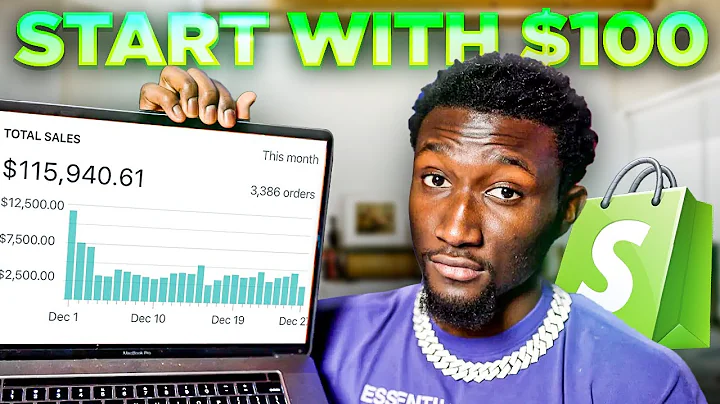From Teenager to Profitable Amazon FBA Seller: My Retail Arbitrage Journey
Table of Contents
- Introduction
- The Discovery of dropshipping
- Exploring Retail Arbitrage
- Overcoming Challenges with Amazon Restrictions
- The Importance of Wholesalers in Retail Arbitrage
- The Journey of Finding Replenishable Products
- The Profitability of Retail Arbitrage
- The Reality of Time and Income in Retail Arbitrage
- The Impact of Expenses on Profitability
- Conclusion
Introduction
Have you ever wondered how to start a successful Amazon FBA store as a teenager with just a bike? In this article, I will share my personal journey of opening and running a profitable Amazon FBA store as a 15-year-old. From discovering different business strategies like dropshipping and retail arbitrage to facing challenges with Amazon's restrictions, I will provide valuable insights and tips for those interested in pursuing a similar venture. Join me as I take you through the highs and lows of my experience and reveal the potential profitability of retail arbitrage. Let's dive in!
The Discovery of Dropshipping
My journey began when I stumbled upon a YouTube video discussing the concept of dropshipping. Intrigued by the idea of selling products without maintaining an inventory, I started researching this business model. However, I soon found out that dropshipping was against Amazon's terms of service, dampening my initial enthusiasm. Undeterred, I continued my search for a viable business strategy.
Exploring Retail Arbitrage
During my research, I came across a video by the channel "Reezy Resells," which introduced me to the concept of retail arbitrage. Retail arbitrage involves finding deeply discounted products in physical retail stores, such as clearance aisles, and reselling them on Amazon for a profit. Inspired by this new approach, I delved deeper into learning about retail arbitrage through various YouTube tutorials and resources.
Overcoming Challenges with Amazon Restrictions
As a new seller on Amazon, I faced the challenge of being restricted from selling in many categories. While I discovered numerous profitable products, I was unable to sell them due to these restrictions. Determined to find a solution, I explored different methods of getting ungated in restricted categories. I tried a website called "The Funnel Guru," which claimed to unrestrict sellers in multiple categories. However, this turned out to be a mistake, as Amazon denied my request and I received a refund.
The Importance of Wholesalers in Retail Arbitrage
Undeterred by the setback, I continued my search for a way to overcome Amazon's restrictions. I discovered that one could get ungated by purchasing from wholesalers and submitting an invoice to Amazon. After applying to several wholesale websites, I was accepted by one called "Frontier Coop." Placing an order for products in the desired categories, I eagerly awaited the outcome.
The Journey of Finding Replenishable Products
After successfully getting ungated in specific categories, I focused on finding replenishable products that I could consistently restock. This became my primary goal, as it allowed me to generate a continuous stream of sales and profits. While I initially struggled to find such products, my efforts eventually paid off when I discovered my best-selling item, a microfiber hair towel. Buying them for a low price and selling them at a profitable margin, I quickly realized the potential of retail arbitrage.
The Profitability of Retail Arbitrage
With a combination of restricted sales and profitable products, my Amazon FBA store started generating impressive revenue. In just 30 days, I managed to generate over $4,000 in revenue. However, it's essential to note that the profitability of retail arbitrage depends on various factors, including the availability of discounted products, market demand, and pricing strategies.
The Reality of Time and Income in Retail Arbitrage
While retail arbitrage can be a lucrative business, it requires a significant investment of time. Scouring physical retail stores for profitable deals, sourcing products, managing inventory, and ensuring timely shipments all demand a considerable commitment of time and effort. However, I believe that with dedication and strategic decision-making, one can optimize time spent and maximize income potential.
The Impact of Expenses on Profitability
When calculating profitability, it's crucial to consider expenses associated with running an Amazon FBA store. Subscriptions to vital software tools and services, such as inventory management software and data analytics platforms, can significantly impact your overall profits. It's essential to strike a balance between utilizing these tools for efficiency and ensuring that the costs do not erode your margins.
Conclusion
In conclusion, starting and running a successful Amazon FBA store through retail arbitrage is within reach, even for young entrepreneurs. While there are challenges to overcome, such as Amazon restrictions and managing expenses, with persistence and effective sourcing strategies, one can achieve profitability. Remember, retail arbitrage requires time and dedication, but it can offer a flexible and potentially rewarding business opportunity. So, if you're ready to embark on your journey as an Amazon FBA seller, start exploring retail arbitrage and unleash your entrepreneurial spirit!



















